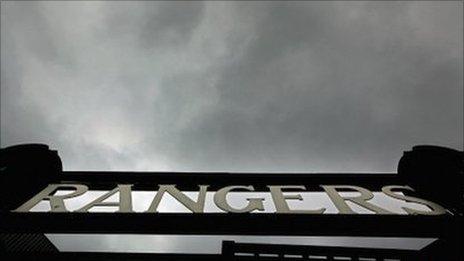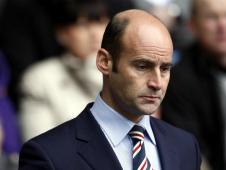A giant on the ropes: Rangers' tax troubles Q&A
- Published

There is a storm brewing over Ibrox, the home of a true giant in British football
For 90 minutes at Ibrox this Sunday, all will seem normal in Scottish football.
Rangers and Celtic will tear into each other, more than 50,000 fans at the game will roar themselves hoarse, thousands more will shout at their computers, radios and televisions, and police in Glasgow, Belfast and beyond will ready themselves for a lively shift. It will be business as usual for the Old Firm.
But for Rangers, the champions and current league leaders, the past week has been anything but business as usual. Two legal setbacks in an Edinburgh court have broken the seal on Rangers' darkest secret: they are staring apparent financial ruin in the face.
This epiphany has brought forth a flood of questions from fans, detractors and other interested observers: most of these can be summed up as variations on shock or schadenfreude. I cannot promise to answer all of them but I will try to tackle the most pressing.
Q: What on earth is going on?
A: Rangers are being pursued by HM Revenue and Customs (HMRC) for two unpaid bills. With interest and late-payment penalties going back more than 10 years, they now total in the region of £54m, although the final figure could be even higher according to some sources.
Q: How did that happen?
A: The only simple way to answer this is to start with an important distinction: tax avoidance is legal, tax evasion is illegal. Rangers, like most companies and wealthy individuals, have tried to reduce their tax bills. Some people say this is the cynical exploitation of loopholes, others say it is business (and it is, to be fair, pretty big business).
There is, however, a fine line between avoidance and evasion and Rangers MAY have smudged it over the last decade with two schemes designed to reward their top earners in the most "tax efficient" way.
Q: What did they do?
A: Let's deal with the biggest bill first.
Between 2001 and 2010, Rangers paid almost £48m into an Employee Benefit Trust, external (EBT). A trust is a legal creation that enables somebody to own an asset on behalf of somebody else. The first person is the trustee and the second is the beneficiary. Company pension schemes are a common example of a trust.
With EBTs, an employer pays money into a trust and that money is paid out to the beneficiaries in the form of loans. These loans are not subject to income tax or National Insurance. In fact, most of these trusts are based in offshore tax havens so they are hardly taxed at all.
Anyway, these loans are a bit like the ones you would offer a hard-up friend on a night out - here's £20, pay me back when you can but I'm not going to remember this so don't worry about it. Here, however, is the heart of HMRC's case.
For an EBT to stay on the right side of the avoidance/evasion line, these payments cannot be made on a contractual basis, as that would make them wages and therefore subject to the usual deductions. So they should, on occasion, be postponed and even refused by the trustee, who is, in theory, acting independently of the employer anyway.
HMRC says Rangers' EBT did not work like this and was, for all intents and purposes, a tax scam. It also says it has proof of this in the form of documents and emails between Ibrox's top brass and players' agents. So, last year, an angry taxman hit Rangers with a bill for £35m in unpaid tax and interest and £14m in penalties.
Rangers, already in debt to their banker and other creditors to the tune of almost £30m, denied the accusation of tax evasion and went to a tribunal in October to argue their case.
That hearing lasted for two weeks but when no decision was reached it was rescheduled for a further three weeks this spring. Again, no decision came and a final tribunal hearing will take place in November.
Q: What about the other bill?
A: This one emerged in the club's accounts this April and is related to a different tax avoidance ruse operated between 1999 and 2003.
Called a Discounted Options Scheme, it is a more complicated version of the EBT as it funnels what experts call the "disguised remuneration" through a "money-box company" set up in a tax haven. The beneficiary then gets shares in the company and you can guess the rest.
It was, for a while, a popular way for bankers to avoid paying tax on their bonuses but HMRC closed the loophole and has been chasing up lost tax ever since.
The sum Rangers owe - and they have agreed this much - is £2.8m in back taxes and interest. What they continue to dispute is the £1.4m HMRC is demanding in penalties. The undisputed amount is due now, in fact, it's overdue again, if that makes sense.
The taxman has been applying considerable pressure in recent weeks, via the courts, prompting some to wonder if Rangers can even pay this relatively small sum, which brings us to this week's shenanigans.
Q: The two legal defeats in Edinburgh?
A: Yes, broadly speaking.
In the first, Rangers were taken to court over an unpaid legal bill of £35,000. The amount and what it was for are not relevant to this tale but what came out in court last week is. The law firm in question effectively put in black and white what some had been saying for some time: Rangers might go bust, we want our money now.

Bain's 15-year career at Ibrox came to an end when Craig Whyte took over
If that message had not got through it was spelled out in bold type all over the Scottish tabloids this week when Martin Bain, the former Rangers chief executive, successfully persuaded a judge to freeze £480,000 of Rangers' money, external just in case they might not be able to pay the £1.3m in damages he wants for breach of contract.
The judge ring-fenced half of what the life-long Rangers fan was asking to freeze because he agreed there was a "real and substantial risk of insolvency". That would make a win for Bain in vain.
But what really hurt Rangers' new owner Craig Whyte, the man who pushed Bain out, was the leaking of court papers filed by the ex-CEO that revealed just how exposed Rangers are to an HMRC victory.
And Bain should know, he went to work at Ibrox in 1996, joined the board in 2000 and ran the business for former owner Sir David Murray from 2005.
Having recently mortgaged off the next few years' catering revenues at Ibrox, Whyte can afford to pay the smaller tax bill and worry about filling the hole in the club's finances later. But being forced to pay even a hefty chunk of the big bill will kill a club that played a European final only three years ago.
Q: So why did Whyte buy Rangers with all this hanging over them?
A: The only sensible answer to this question is "pass" as so much is uncertain and so little is known for sure about Whyte's finances.
But in the time it has taken me to write this piece, the 40-year-old businessman has issued a passionate denial that Rangers are at the abyss.
"The club is trading normally and has a strong balance sheet," Whyte said via Rangers' official website, before lambasting Bain and others for wrongly suggesting the club is on the brink.
"No one can say with 100% certainty what the outcome will be - that is why there is a tribunal," Whyte added. "(But) I can say categorically that we will be fighting the club's case most vigorously."
And that, with an Old Firm game looming, is all any Rangers fan can ask for.
- Attribution
- Published14 September 2011
- Attribution
- Published13 September 2011
- Attribution
- Published13 September 2011